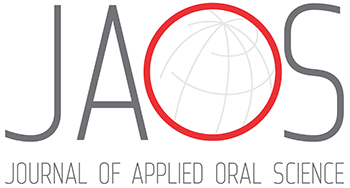The original protocol for implant prosthesis recommends the use of a gold framework for acrylic and ceramic prosthesis. However, due to its high cost, the use of alternative alloys is desired. This study compares the marginal accuracy of pre-made cylinders versus plastic cylinders cast with two different base metal casting alloys. Five samples each of (1) plastic cylinder cast in cobalt-chromium alloy, (2) plastic cylinder cast in nickel-chromium alloy, and (3) silver-palladium pre-made cylinder (control) were examined for marginal accuracy according to: (A) vertical gap; (B) horizontal gap and (C) horizontal gap depth at the abutment/cylinder interface. Data were submitted to statistical analysis (ANOVA and Student-Newman Keuls, p<0.05). Mean values for vertical, horizontal and gap depth were 4.13µm, 14.5µm and 6.93µm for pre-made cylinder, 23.18µm, 33.2µm and 88µm for Ni-Cr cast cylinder and 25.6µm, 51.8µm and 114.54µm for Co-Cr cast cylinder. No statistically significant differences were found between cast groups (1 and 2), but significant better fit was obtained with pre-made metal cylinders when compared to cast cylinders with Ni-Cr and Co-Cr alloys, for all analyses.
Implant prosthesis; Alloys













